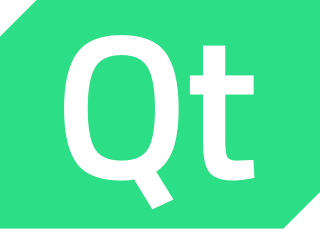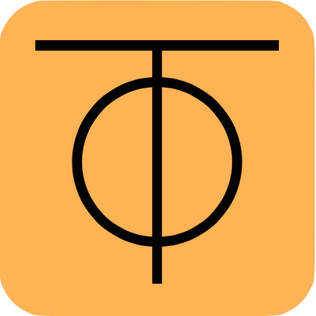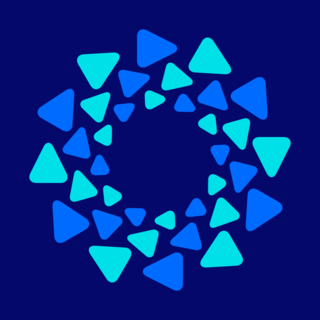
Qt is a cross-platform application development framework for creating graphical user interfaces as well as cross-platform applications that run on various software and hardware platforms such as Linux, Windows, macOS, Android or embedded systems with little or no change in the underlying codebase while still being a native application with native capabilities and speed.

Open Cascade Technology (OCCT), formerly called CAS.CADE, is an open-source software development platform for 3D CAD, CAM, CAE, etc. that is developed and supported by Open Cascade SAS company.
In free and open-source software (FOSS) development communities, a forge is a web-based collaborative software platform for both developing and sharing computer applications.

The open-core model is a business model for the monetization of commercially produced open-source software. The open-core model primarily involves offering a "core" or feature-limited version of a software product as free and open-source software, while offering "commercial" versions or add-ons as proprietary software. The term was coined by Andrew Lampitt in 2008.
OpenWrt is an open-source project for embedded operating systems based on Linux, primarily used on embedded devices to route network traffic. The main components are Linux, util-linux, musl, and BusyBox. All components have been optimized to be small enough to fit into the limited storage and memory available in home routers.

OpenShift is a family of containerization software products developed by Red Hat. Its flagship product is the OpenShift Container Platform — a hybrid cloud platform as a service built around Linux containers orchestrated and managed by Kubernetes on a foundation of Red Hat Enterprise Linux. The family's other products provide this platform through different environments: OKD serves as the community-driven upstream, Several deployment methods are available including self-managed, cloud native under ROSA, ARO and RHOIC on AWS, Azure, and IBM Cloud respectively, OpenShift Online as software as a service, and OpenShift Dedicated as a managed service.

Vagrant is a source-available software product for building and maintaining portable virtual software development environments; e.g., for VirtualBox, KVM, Hyper-V, Docker containers, VMware, Parallels, and AWS. It tries to simplify the software configuration management of virtualization in order to increase development productivity. Vagrant is written in the Ruby language, but its ecosystem supports development in a few other languages.

Movim is a distributed social network built on top of XMPP, a popular open standards communication protocol. Movim is a free and open source software licensed under the AGPL-3.0-or-later license. It can be accessed using existing XMPP clients and Jabber accounts.

Spark is an open-source instant messaging program that allows users to communicate in real time.

Advanced Simulation Library (ASL) is a free and open-source hardware-accelerated multiphysics simulation platform. It enables users to write customized numerical solvers in C++ and deploy them on a variety of massively parallel architectures, ranging from inexpensive FPGAs, DSPs and GPUs up to heterogeneous clusters and supercomputers. Its internal computational engine is written in OpenCL and utilizes matrix-free solution techniques. ASL implements variety of modern numerical methods, i.a. level-set method, lattice Boltzmann, immersed boundary. The mesh-free, immersed boundary approach allows users to move from CAD directly to simulation, reducing pre-processing efforts and number of potential errors. ASL can be used to model various coupled physical and chemical phenomena, especially in the field of computational fluid dynamics. It is distributed under the free GNU Affero General Public License with an optional commercial license.
HashiCorp, Inc. is an American software company with a freemium business model based in San Francisco, California. HashiCorp provides tools and products that enable developers, operators and security professionals to provision, secure, run and connect cloud-computing infrastructure. It was founded in 2012 by Mitchell Hashimoto and Armon Dadgar. The company name HashiCorp is a portmanteau of co-founder last name Hashimoto and Corporation.
OpenVR is a software development kit (SDK) and application programming interface (API) developed by Valve for supporting the SteamVR and other virtual reality headset devices. The SteamVR platform uses it as the default application programming interface and runtime. It serves as the interface between the virtual reality hardware and software and is implemented by SteamVR.
Terraform is an infrastructure-as-code software tool created by HashiCorp. Users define and provide data center infrastructure using a declarative configuration language known as HashiCorp Configuration Language (HCL), or optionally JSON.

ZeroTier, Inc. is a software company with a freemium business model based in Irvine, California. ZeroTier provides proprietary software, SDKs and commercial products and services to create and manage virtual software-defined networks. The company's flagship end-user product ZeroTier One is a client application that enables devices such as PCs, phones, servers and embedded devices to securely connect to peer-to-peer virtual networks.

Fyne is a free and open-source cross-platform widget toolkit for creating graphical user interfaces (GUIs) across desktop and mobile platforms. It is designed to enable developers to build applications that run on multiple desktop and mobile platforms/versions from a single code base. Fyne uses OpenGL to provide cross-platform graphics. It is inspired by the principles of Material Design to create applications that look and behave consistently across all platforms. It is licensed under the terms of the 3-clause BSD License, supporting the creation of free and proprietary applications. In December 2019 Fyne became the most popular GUI toolkit for Go, by GitHub star count and in early February 2020 it was trending as #1 project in GitHub trending ranks.
Open Service Mesh (OSM) was a free and open source cloud native service mesh developed by Microsoft that ran on Kubernetes.
The Business Source License is a software license which publishes source code but limits the right to use the software to certain classes of users. The BUSL is not an open-source license, but it is source-available license that also mandates an eventual transition to an open-source license. This characteristic has been described as a compromise between traditional proprietary licenses and open source.









